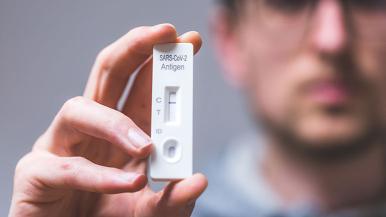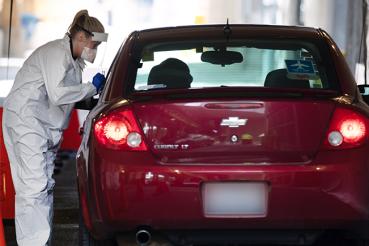When it comes to detecting COVID-19, can you trust a test that you bought at a retail store or online?
Although at-home tests that have emergency use authorization from the U.S. Food and Drug Administration are about 80% to 90% accurate, they still aren’t quite as good as the molecular tests, also known as PCR (polymerase chain reaction) tests, that you would typically get at a hospital, clinic or pharmacy.
“A PCR or molecular test is still the gold standard,” says Mary Hayden, MD, chief of infectious diseases and the James Lowenstine Professor of Internal Medicine at Rush University Medical Center. These tests are typically sent to a lab, which means it takes longer to get the results.
But the off-the-shelf rapid antigen tests that give you results in minutes do have value. “I think they can be another useful tool for people to start living their lives more fully again,” Hayden says.
Here, she offers some guidance to help you determine which COVID-19 test to use.
When you have COVID-19 symptoms
If you have COVID-19 symptoms like cough, fever or shortness of breath, Hayden recommends getting a PCR test even if you’ve done an antigen test at home. This can help confirm the results, whether they are positive or negative.
So why bother doing an antigen test in the first place? Getting a positive result from a rapid antigen test can help guide your next steps, such as reaching out to your doctor and taking precautions to limit your exposure to others, Hayden says. Many antigen test kits also include two tests, so you can repeat the test in the next day or two.
If you’re hesitant to get a PCR test because you don’t want a long swab up your nose, there’s good news: More tests are available now that take a sample from just inside the nostrils or a bit further inside the nose. Some PCR tests also use saliva samples.
Also, if you don’t want to leave the house, some PCR tests can be done at home and mailed to a lab, with results available in a few days, Hayden says.
When you are exposed to someone with COVID-19
Here, too, Hayden recommends getting a PCR test over a rapid antigen test. If you have had close contact for at least 15 minutes with someone with suspected or confirmed COVID-19, the CDC recommends getting tested three to five days after exposure.
The CDC also has issued testing guidance if you have had ongoing exposure to a household member with COVID-19:
- If you are fully vaccinated, you’ll want to get tested three to five days after your first exposure and then again three to five days after the isolation period ends.
- If you are not fully vaccinated, you’ll want to get tested immediately and then again five to seven days after the isolation period ends.
When you’re pressed for time
One of the downsides of many PCR tests is that you may have to wait a few days to get the results (at Rush, the turnaround time for a lab PCR test is one day). So, if an out-of-town friend or relative plans to stop by on short notice, a rapid antigen test may be helpful. “I think of testing as a thoughtful way to be considerate of each other,” Hayden says.
Still, it’s important to remember that the results of a rapid antigen test may not be as accurate as a PCR test, Hayden says.
When you need to travel abroad
Countries have different rules, so you’ll need to check to see which type of test (PCR or antigen, home or laboratory) is required and when you need to get the test before you travel, Hayden says. Many destinations, including European countries, require a negative COVID test no more than 72 hours before you travel.
When you need a test to return to work or school
Many workplaces and school districts have implemented their own free testing programs, which may use PCR or antigen tests. If you or a family member gets COVID-19, your employer or school may require a negative COVID-19 test (in addition to completing a quarantine at home) before you return to school or work. Because the rules vary, Hayden recommends checking with your school or employer for specifics.
When you want to visit an elderly relative
Here, a rapid antigen test may be useful, depending on the circumstances. “If you have no COVID symptoms, are fully vaccinated and then have a negative antigen test, your chance of having COVID and exposing an elderly relative or other immunocompromised or vulnerable person is very low, at least over the next 12 to 24 hours,” Hayden says.
You may prefer to get a PCR test in this situation if you are unvaccinated, because unvaccinated people are much more likely to be infected than vaccinated people, and the PCR test is more sensitive, she adds. If results of the PCR test are delayed more than one day, though, this result becomes less useful.
What about antibody tests?
Antibody tests can’t diagnose COVID-19. Instead, they detect antibodies in your blood that fight the virus that causes COVID-19. But they can’t yet show if you have immunity or protection from COVID-19.
For most people, getting an antibody test now isn’t worth it. “The problem is we still don’t know how much antibody you have to have in your blood to be protected,” Hayden says. “Also, the antibody tests are not standardized, so a value in one test isn’t the same as a value in another test.”
However, if you have a very weak immune system that doesn’t respond well to vaccines, getting what’s known as a “spike protein” antibody test about a month after completing a COVID vaccination series may be of value, Hayden says. This antibody test can help determine if the vaccine was effective at triggering any antibody response. If it wasn’t, you can talk with your doctor about the best way to protect yourself.





